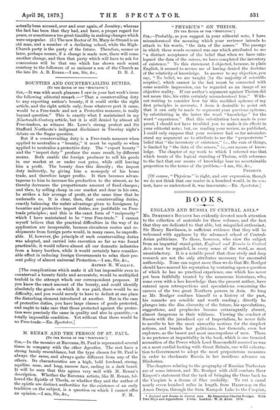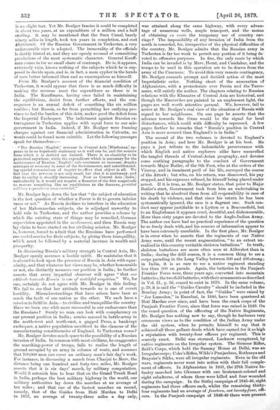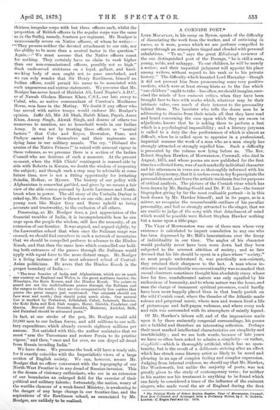BOOKS.
ENGLAND AND RUSSIA IN CENTRAL ASIA.* MR. DEMETRIUS BOULGER has evidently devoted much attention to the collection of materials for these volumes, and the fact that they are dedicated to that able, but misguided enthusiast, Sir Henry Rawlinson, is sufficient evidence that they will be welcomed with applause by the advanced school of Central- Asian politicians. To those, however, who view the subject from an impartial stand-point, England and Russia in Central Asia must be regarded, in every sense of the word, as most unsatisfactory. It is a notable proof that close study and deep research are not the only attributes necessary for successful authorship. None can regret more than we do that Mr. Boulger should have marred his reputation by venturing upon a question of which he has no practical experience, one which has never yet been faithfully treated by the numerous historians, who, some even with a less knowledge than the present author, have entered upon retrospections and speculations concerning the careers of the two great Northern powers in Asia. So long as Mr. Boulger confines himself to a history of the past, his remarks are sensible and worth reading ; directly he plunges into the dim obscurity of the future, his speculations, suggestions, and prophecies become extravagantly absurd, almost dangerous in their wildness. Viewing the conduct of Russia with the jaundiced eye of Imperialism, he never fails to ascribe to her the most unworthy motives for the simplest actions, and brands her politicians, her Generals, even her explorers, as the basest and most unscrupulous of men. There is no pretence at impartiality in the book, which is one frenzied accusation of the Power which Lord Beaconsfield assured us was on a most cordial footing with Great Britain, one wild exhorta- tion to Government to adopt the most preposterous measures in order to checkmate Russia in her insidious advance on Hindostan.
The chapters relating to the geography of Russian Turkestan are of some interest, and Mr. Boulger with skill combats Herr Kiepert's statement that the task of bringing the Oxus back to. the Caspian is a dream of Slav credulity. To cut a canal nearly seven hundred miles in length, from Hazar-asp on the Amou Darya, through the Sara Kamysh Lake to the Caspian,
• England and Russia in Central Asia. By Demetrlun Charles Boulger. With Two Maps and Appendices. 2 Tole. London: W. H. Allen. 1879.
is no slight feat. Yet Mr. Boulger fancies it could be completed in about two years, at an expenditure of a million and a half sterling. ' It may be mentioned that the Suez Canal, barely . ninety miles in length, took ten years in completion, and cost £8,000,000. Of the Russian Government in Turkestan, a very unfavourable view is adopted. The immorality of the officials is darkly hinted at, and they are openly accused of committing peculations of the most systematic character. General Kauff- man comes in for no small share of contempt. He is, it appears, extremely vain, knows nothing of the subjects which he is sup- posed to decide upon, and is, in fact, a mere cypher in the hands of men better informed than and as unscrupulous as himself.
From Mr. Boulger's account of the financial condition of Turkestan, it would appear that there is as much difficulty in making the revenue meet the expenditure as there is in India. The Kauffmans, having once failed in maintaining the equilibrium, desist from further efforts, and the con- sequence is an annual deficit of something like six million roubles ; but Russia, so far from permitting her outlying pro- vince to feel the burden of this debt, makes good the deficit from the Imperial Exchequer. The indictment against Russian ex- travagance in Turkestan applies with equal force to our mis- government in India. Indeed, if Mr. Boulger were framing charges against our financial administration in Calcutta, no words could be found more suitable. Let the following passages speak for themselves
"The Russian [English] revenne in Central Asia [Hindostan] ap- pears to be as hopelessly stationary as it well can be, and the sources from which it is derived are limited. There is no elasticity to be perceived anywhere, while the expenditure which is necessary for the maintenance of Russian [English] rule continues to increase, despite attempts at economy in some of the Governments, and notwithstand- ing special commissions of inquiry to effect that object in all. We find that the revenue is not only small, but that it is stationary, and that its outlay is steadily increasing. Poor as Central Asia [India] undoubtedly is, it would not require a financier of the first magnitude to restore something like an equilibrium to the finances, provided military expenditure were curtailed."
Mr. Boulger lays down the law that "the subject of education is the test question of whether a Power is fit to govern inferior races or not." As Russia declines to interfere in the education of her Mahommedan subjects, she is adjudged unworthy to hold rule in Turkestan, and the author provides a scheme by which the existing state of things may be remedied, German supervision appointed in the madrassees, and then Russia may lay claim to have started on her civilising mission. Mr. Boulger is, however, forced to admit that the Russians have performed one useful service for their subjects, by giving them tranquillity, which mist be followed by a material increase in wealth and prosperity.
In discussing Russia's military strength in Central Asia, Mr. Bonlger openly assumes a hostile spirit. He maintains that it . is absurd to look upon the presence of Russia in Asia with equa- nimity, and that whatever her views may be, whether honourable or not, she distinctly menaces our position in India ; he further asserts that every impartial observer will agree "that our attitude towards Russia is one of watchful susyiehm." We, for one, certainly do not agree with Mr. Boulger in this feeling. We fail to see that her attitude towards us is one of covert hostility. Misunderstandings that have arisen have been as much the fault of one nation as the other. We each have a mission to fulfil in Asia,—to civilise and tranquillise the country Have we been one whit more successful in our endeavours than the Russians ? Surely no man can look with complacency on our present position in India; armies massed in battle-array in the north-west and north-east, a gagged Press, a bankrupt exchequer, a-native population sacrificed to the clamour of the manufacturing constituencies of England. Is Turkestan worse?
Mr. Bonlger devotes much space to the possibility of a Russian invasion of India. In-common with most civilians, he exaggerates the marching-power of troops, fails to realise the length of ground occupied by an army in column of route, and assumes that 100,000 men can cover an ordinary man's fair clay's work. For instance, in discussing a march from Charjui to Merv, the distance being one hundred and forty-two -miles, Mr. Bonlger asserts that it is six days' march, by military computation. Would it astonish him to hear that on the Grand Trunk Road in India, perhaps the best military highway in the world, our military authorities lay down the marches -at an average of
ten miles ; and that one of the fastest marches on record, namely, that of the Guides from Hoti Mardan to Delhi in 1857, an average of twenty-three miles a day only,
was attained along the same highway, with every advan- tag'e of numerous wells, ample transport, and the -means of obtaining em route the temporary use of country - car- riage ? The impossibility of any invasion of .India from the north is conceded, for, irrespective-of the physical difficulties of the country, Mr. Boulger admits that the Russian army in Turkestan is far too weak to permit any portion of it being de-, voted to offensive purposes. In fine, the only route by which India can be invaded is by Merv, Herat, and Candahar, and the troops to be used in this operation are to be drawn from the army of the Caucasus: -To avoid this.very remote contingency, Mr. Boulger counsels prompt- and--decided action of the most Imperialistic order. Nothing- short-of the annexation of Afghanistan, with a protectorate over Persia and the Turco- mans, will satisfy the author. The chapters relating to Russian relations with the Khanates of Central Asia are historical, and though the Muscovites are painted in an unpleasant light, the pages are well worth attentive perusal. We, however, fail to arrive at Mr. Boulger's real view of the situation of Russia with regard. to her neighbours. On one page he asserts that the advance towards the Oxus would be the signal for local disturbances, which could with difficulty be repressed. A few pages further he remarks that " Russia's position in Central Asia is more assured than England's is in India."
The second of the two volumes is devoted to England's position in Asia; and here Mr. Boulger is at his best. He pays a just tribute to the indomitable perseverance with which English and native explorers alike have unravelled the tangled threads of Central-Asian geography, and devotes some scathing paragraphs to the conduct of Government towards Major Butler, of the 9th Foot, who at the orders of the Viceroy, and in imminent peril of his life, surveyed the course of the Attrek ; but who, on his return, was disavowed, his pay stopped, and his expenses refused, he himself being placed under arrest. If it is true, as Mr. Boulger states, that prior to Major Butler's start, Government took from him an undertaking in writing that he absolved them from all responsibility in case of his death by violence, and that since his return he has - been systematically ignored, the case is a flagrant one. Such con- duct may appear justifiable to a Lytton or a Beaconsfield, but to an Englishman it appears cruel, deceitful, and dishonourable.. More than sixty pages are devoted to the Anglo:Indian Army. The author can have had no practical experience of the question he so freely deals with, and his sources of information appear to have been extremely unreliable. In the first place, Mr. Boulger is in error when he asserts that the regiments of our Native Army were, until the recent augmentation, " to an extent un- realised in this country veritable skeleton battalions." In truth, skeleton battalions are more often seen at Aldershot than in India; during the drill season, it is a common thing to see a corps parading in the Long Valley between 300 and 400 strong; in India, it is as rare to see a native regiment standing less than 500 on parade. Again, the-batteries in the Punjaub Frontier Force were, three years ago, converted into mountain batteries, the two field batteries, with their armaments as described in Vol. II., p. 36, ceased to exist in 1876. In the same volume, p. 39, it is said the " Guides Cavalry " should be included in the Bombay Army; in point of fact, the " Guides " were raised by " Joe Lumsden," in Eusufzai, in 1846, have been quartered at Hoti Mardan ever since, and have been the crack corps of the Punjaub Frontier Force, since that force was raised in 1849. On the vexed question of the officering of the Native Regiments, Mr. Boulger has nothing new to say, though he harbours very erroneous views as to the condition of the Indian Army under the old system, when he permits himself to say that it achieved all those gallant deeds which hale, earned-for it so high a reputation with twenty-four officers per regiment. - This is scarcely exact. Delhi was stormed, LucknOw recaptured, by native regiments on the Irregular system. The Sirmoor Reid's Corps, which held the 'Sammy 'Hous—e at Delhi, was an Irregular corps ; Coke's Rifles, Wilde's Punjaubees, Rothneys and Braysier's Sikhs, were all irregular regiments. Even in the old wars, regiments never went into action with their full comple- ment of officers. In Afghanistan in 1841, the 27th Native In- fantry marched into Ghnznee with one lieutenant-colonel and eight subalterns, of whom three were killed and four wounded during the campaign. In the Siitlej campaign of 1845-46, eight regiments had three officers each, whilst the remaining thirty- four regiments had an average of fourteen, not twenty-four, offi- cers. In the Punjaub campaign of 1848-49 there were present
thirteen irregular corps with but three officers each, whilst the • proportion of British officers in the regular corps was the same as in the Sutlej, namely, fourteen per regiment. Mr. Boulger is ' unnecessarily severe on Native officers, of whom he writes :- +'t They possess neither the devoted attachment to our rule, nor the ability to be more than a neutral factor in the question."
Again,--" We must assume that the Native officers count for nothing. They certainly have no claim to rank higher than our non-commissioned officers, possibly not so high."
Such undeserved strictures on a loyal, gallant, and hard- wo-king body of men ought not to pass unrebuked, and we can only wonder that Sir Henry Rawlinson, himself an Indian officer, could permit his name to he associated with such ungenerous and untrue statements. We presume that Mr.
Boulger has never heard of Haidaiat Ali, Lord Napier's A.D.C., or of Naivab Gholam Hassan Khan, C.S.I., our late envoy to Cabal, who, as native commandant of Cureton's Mooltanee Horse, won fame in the Mutiny. We doubt if any officer who has served with native troops would endorse Mr. Boulger's opinion. Jaffir Ali, Mir All Shah, Habib Khan, Payab, Azeez Khan, Anoop Singh, Akwak Singh, and dozens of others too numerous to mention, are as household words in our Indian Army. It was not by treating these officers as " neutral factors " that Coke and Keyes, Brownlow, Pane, and Probyn• earned for themselves and their regiments un- dying fame in our military annals. The cry, " Disband the armies of the Native Princes !" is raised with unusual vigour in these volumes, so we presume there is a section of the Indian Council who are desirous of such a measure. At the present moment, when the Sikh Chiefs' contingent is massed side by side with Roberts in Kuram, we doubt the wisdom of reopening the subject ; and though such a step may be advisable at some future time, now is not a fitting opportunity for irritating Scindia, Holkar, or Mysore. The history of our policy with Afghanistan is somewhat garbled, and gives by no means a fair view of the able course pursued by Lords Lawrence and North- brook when in power. The old story of the Umballa Durbar is raked up, Mr. Seton Karr is thrust on one side, and the views of young men like Major Grey and Burne upheld as being accurate and trustworthy, to the exclusion of all others.
Possessing, as Mr. Boulger does, a just appreciation of the financial troubles of India, it is incomprehensible how he can urge upon the people the wisdom, still less the necessity, of an , extension of our frontier. It was argued, and argued rightly, by the Lawrentian school that when once the Suliman range was crossed, we should find ourselves in such a network of mountains that we should be compelled perforce to advance to the Hindoo Koosh, and that then the same laws which counselled our hold- ing both entrances of the passes through the Suliman would apply with equal force to the more distant range. Mr. Boulger is a living instance of the most advanced school of Central- . Asian politicians. He avers that the Hindoo Koosh is the proPer boundary of India :—
"The true frontier of India and Afghanistan, which are as much one country as England and Wales, is the great northern barrier, the Himalaya, the Kara Koram, and the Hindoo Koosh. The points to guard are not the multitudinous passes through the Suliman and the ranges to the south ; they are the comparatively few outlets that pierce the great ranges just mentioned. Our outposts should not face west and north; they should point north alone. Our natural line is marked by Peshawar, Jellalabad, Cabal, Inderaub, Bamian, the Kohl Baba and Koh Siah ranges, Herat, Girislik, Candahar, and Quetta. Beyond that frontier, Sarakhs, Maimene, Andchui, Balk, and Faizabad should be advanced posts."
In fact, at one stroke of the pen, Mr. Boulger would add 50,000 men to our Indian forces, and add millions to our mili- tary expenditure, which already exceeds eighteen millions per annum. Not satisfied with this, the author maintains that we must "arm the Turcomans and restore Persia to its pristine vigour,"- and then, " once and for ever, we can dispel all dread from Russia invading India."
We have done. We presume the book will have a ready sale, for it exactly coincides with the Imperialistic views of a large section of English society. We can, however, assure Mr. Boulger that no officer conversant with the topography of our North-West Frontier is in any dread of Russian invasion. This is the dream of visionary enthusiasts, who see in an extension of our boundaries an enlarged field for the exercise of their political and military talents ; fortunately, the nation, weary of the warlike clamour of a weak-kneed Ministry, is awakening to the danger of any large change in our frontier-line, and the aspirations of the Rawlinson school, as enunciated by Mr. Boulger, are unlikely to be realised.




































 Previous page
Previous page